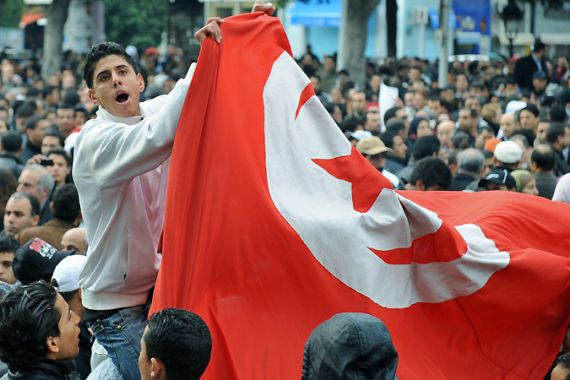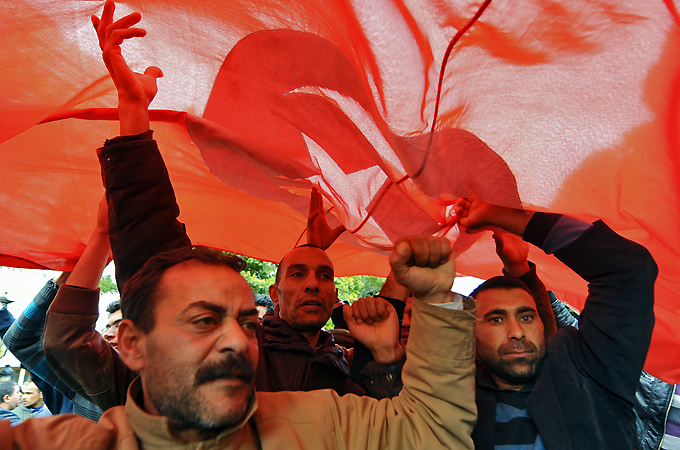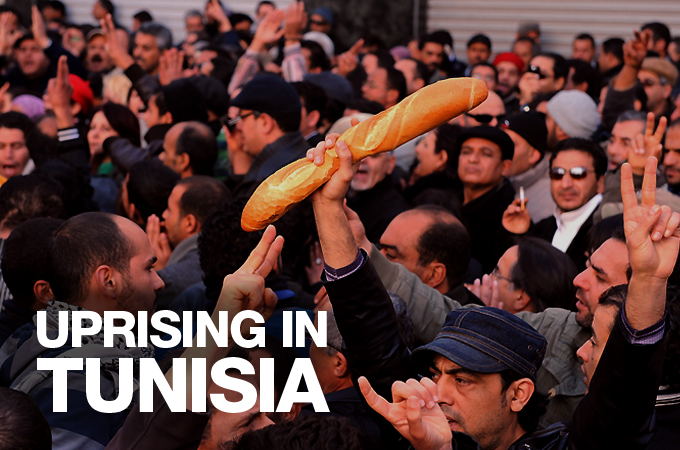Tunisia seeks arrest of ex-leader
Ousted President Ben Ali is wanted to stand trial for theft and currency offences, says the nation’s justice minister.

 |
| Protesters demand interim government be purged of ministers who had been members of Ben Ali’s ruling party [AFP] |
Tunisia wants to have ousted president Zine El Abidine Ben Ali and his family arrested and put on trial for possession of expropriated property and for transferring foreign currency abroad, the nation’s interim justice minister has said.
Interpol, the international police agency, has been asked to help arrest Ben Ali, his wife Leila Trabelsi and other family members who have fled the country, Lazhar Karoui Chebbi said on Wednesday.
Ben Ali went to Saudi Arabia this month after weeks of violent protests against poverty, repression and corruption. He amassed vast riches during his 23 years in power, with his family controlling many of Tunisia’s biggest companies.
“We are asking Interpol to find all those who fled, including the president and this woman, for trial in Tunisia,” the justice minister said.
Interpol alert
The French-based international police organisation confirmed it had issued a global alert to seek the location and arrest of Ben Ali and six of his relatives.
Under this type of alert, Interpol said it had requested member countries to locate and provisionally arrest the suspects with a view to their extradition to Tunis.
 |
| Follow Al Jazeera’s complete coverage |
Chebbi also said six members of the presidential guard would also be put on trial for inciting violence after Ben Ali’s departure.
Al Jazeera’s Hashem Ahelbarra, reporting from Tunis, said news of the apparent moves to arrest Ben Ali had done little to satisfy the demonstrators.
“The decision to take legal action is being viewed by the people on the streets as just a quick fix,” he said.
“According to those I have spoken to, what they would like to see is for this government to resign in order for them to believe that there is a new radical change that takes into account the will and the aspirations of the Tunisians.”
Inspired by Tunisia’s example in toppling Ben Ali, thousands of Egyptians have taken to the streets of Cairo and other cities to demand an end to President Hosni Mubarak’s 30-year rule, clashing with police who fired teargas and used water cannon.
In Tunis, protesters managed to get into the building where the justice minister was speaking and crowded around him after the news conference to petition him about relatives who are still in prison.
‘Complete chaos’
Chebbi said that, in the disorder that followed the fall of Ben Ali, about 11,000 prisoners had escaped from Tunisian jails.
On January 15, the day after Ben Ali left, dozens of inmates were reported to have been killed in a mass breakout from a prison in the town of Mahdia. The same day, 42 inmates were killed in a prison riot in Monastir in what was described by a hospital official as “complete chaos”.
 |
| The toppling of Ben Ali, pictured, has electrified Arabs across the Middle East and North Africa [EPA] |
Chebbi said 2,460 prisoners had been released since Ben Ali was ousted from power. It was not clear how many of them had been in jail for political crimes, but the government said earlier it was releasing all political prisoners.
In Tunis, demonstrators clashed with police on Wednesday, as days of peaceful protests demanding a purge of former regime loyalists in an interim government descended into violence.
Clashes broke out near government offices in the old city, or casbah, where riot police fired teargas at hundreds of demonstrators, mainly teenagers and young men, who threw stones.
Al Jazeera’s Nazanine Moshiri, reporting from Tunis, said Wednesday’s protesters appeared to be Tunisians from the rural hinterland who have been camping out at the government compound “to make their voices heard”.
“They want all members of the former ruling party out of the coalition government. Rocks were thrown at the police, tear gas and water cannons were used against protesters. There have been numerous injuries. It is calm right now but tension is growing [among people from these areas],” she said.
“They say they are not going anywhere till the coalition government resigns. They do not want any members of Ben Ali’s regime still in government.”
They shouted at the security forces that they were the “police of Leila”, a reference to Ben Ali’s unpopular wife, who was seen as having excessive influence and lavish tastes.
Cabinet reshuffle
Ministers said the interim government, which has struggled to assert itself in the face of protesters’ demands to sack the remaining allies of Ben Ali, would be reshuffled later on Wednesday.
According to political sources, Tunisia’s interior, defence and foreign affairs ministers will be replaced as part of a cabinet reshuffle to be announced – a move that could appease anti-government protesters.
The government remains dominated by former members of the ruling RCD party and the new cabinet lineup will mainly fill posts vacated by five resignations over the past week, Education Minister Tayeb Baccouche told the Reuters news agency.
Another minister said some provincial governors would also be replaced.
The Tunisian General Labour Union announced a general strike on Wednesday in Sfax, Tunisia’s second city and economic centre.
The toppling of Ben Ali after 23 years in power, in protests led mainly by young people protesting against poverty, corruption and political repression, has electrified Arabs across the Middle East and North Africa, where many countries face similar problems.
Jeff Feltman, the US assistant secretary of state, visiting Tunis, encouraged the interim government to do more to satisfy the demands of the people, and said Washington was ready to assist Tunisia in preparing for its first free elections.